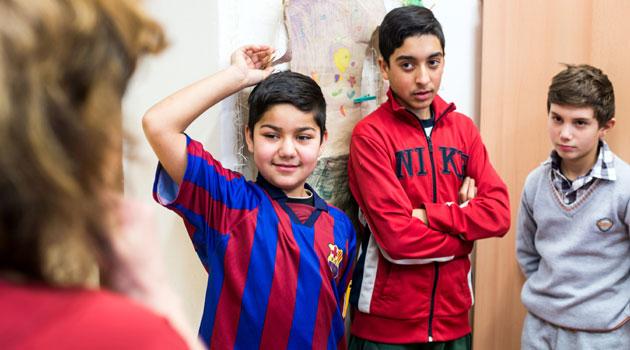Carmen Russo: The Fight For a Better Future. Battling Racism in Czech Schools

A small group of American interns at The New Presence office were exploring the answer to a seemingly difficult question: Why are some Czechs so outwardly racist? According to Martin Stransky, neurologist and editor of the English-language website, the answer is actually quite simple. Czechs are only exposed to one main ethnic minority: Czech Roma. The problem with Czech racism is rooted in the perceived faults of Roma culture.
“Ninety percent of the gypsies are problematic,” he plainly told the students. “They are professional thieves and illiteracy is part of their culture. I don’t mean to sound racist,” he continued. “But that’s just the way it is.”
The perpetuation of stereotypes like these has been happening in the Czech Republic throughout its history. While it is true that some Roma traditions prevented children from attending school, young Roma students have begun to demand change. Many now desire a quality education, but are held back by the racist attitudes still prevalent in the majority of Czech schools.
Until 2005, many Roma children were sent to schools for disabled children, called “special” (zvláštní) schools. After the official disappearance of these schools, Roma children were still disproportionately attending schools with reduced curricula (sometimes referred to as “practical schools”). The numbers were found to be discriminatory in 2007 when the European Court of Human Rights ruled that Roma children were being denied their right to education. With this year’s inclusive education reform in place, the reduced curricula was abolished and children of all abilities can attend the mainstream schools in their home districts. It also makes financial aid more accessible to all, while clarifying socially excluded children, like the Roma, as eligible for financial support. But there is still work to be done.
“The reform is only on paper so far,” said Yveta Kenety, country coordinator and facilitator for the Roma Education Fund.
NGOs like the one Kenety works for are continuing to battle the racism against Roma students and families that often prevents them from achieving academic success. Regardless of the new laws, about 30 percent of Czechs still believe that Roma children should not attend mainstream schools, according to a poll by the Center for Public Opinion Research. They are viewed as untrustworthy and intellectually unable to learn, often being judged by stereotypes that are still held by even some of the most educated Czechs. Those who believe these stereotypes also worry that enrolling too many Roma students would bring down achievement levels and spread resources too thin.
This mindset often results in “white flight” from schools that enroll too many Roma students, according to the observations of Gwendolyn Albert, member of the Board of Roma Education Support Trust (REST). She also points out that Roma parents feel pressured to send their children back to the former “special” schools, which still typically have a majority of Roma students, to protect them from bullying and harassment. As a result, approximately 70 percent of young adult Roma never receive any form of secondary education, according to a 2015 study by Amnesty International. Research published this year by the Czech Ministry of Education also finds that although 85 percent of Roma students in primary schools receive mainstream educations, there are still 83 segregated schools in the country, including 12 that are completely segregated with only Roma students.
Roma parents succumb to the pressure to send their children to segregated schools because many of them experience racial harassment before they turn 10 years old. Martin Dudi, a first year theology student at South Bohemian University, still remembers his first months of elementary school, when no one would sit next to him. As he got older, he often responded to racist remarks with poise and pride for his Roma identity, but he couldn’t contain his anger when it came to his younger sister. As an eight-year-old, she was called a “black nigga” by one of her classmates.
“Is it normal to tell a little kid something like that?” he asked with frustration.
Petr Torak, executive director of the Gypsy Roma Traveller Police Association, was forced to move to the UK with his family to escape hate crimes. He recalls students writing messages like “send gypsies to gas chambers” on his desk or the blackboard when he was eight. Last year, Torak became the first Czech Roma to receive a civilian honor from Queen Elizabeth, which he was awarded for his police work. His organization is now working to advocate for the Czech Republic’s adoption of a system to help students report abuse or harassment in school.
For NGOs, activists and Roma students, this is not an easy problem to solve. But many are willing to try. In cities with heavy Roma populations, like Ostrava and Usti nad Labem, the Roma Education Fund (REF) has focused on implementing integration programs in childhood education. Under the project “Together to Preschool”, Roma children attend private preschools, where they are prepared for going to mainstream schools. The project provides schools with field workers to support Roma children and help their parents communicate with the administration. Kenety also detailed the project´s activity “Your Story”, which brings Roma mothers together during school hours to meet each other, learn about the importance of education and learn how to read children’s books so they can play an active role in their children’s’ education. The project was co-funded by the city of Ostrava, which Kenety believes was a significant step in the right direction for the city’s role in the integration process. But she knows the necessary changes in attitude will still be slow, as they are deep-rooted.
“[Integration] can only happen through doing it,” she said in an interview. “If we put the children in school together and they get to know each other, they will learn there is no need for prejudice. But if we keep separating them, we will never achieve anything.”
Like Kenety, Albert also believes the future of Roma education will require parents to take on a more active role. She finds this important since parents make the ultimate decision about where their children go to school, and the ones who have been neglected are the ones who feel more comfortable sending their children to the former “special” schools.
“Parents need to be brought into the management of the school in a healthy and constructive way, such that the communication with them is clear from the side of the principal and that the principal himself or herself really understands the [integration] laws,” Albert said.
Along with the encouragement of parent participation, Albert focuses on the importance of remodeling the Czech education system based on more successful examples. For example, UK-based NGO REST works with Czech and Slovak Roma children who were misidentified as disabled in their home countries before immigrating. In the UK, they are now enjoying school and receiving high school diplomas. The schools where Roma students are successful, such as Babington College in Leicester, sends mentors to the Czech Republic to observe and coach educators here. The relationship between mentors and educators lasts for three years and the program is enabled by the UK’s unique infrastructure for paying education mentors and coordinating school to school support. Trmice, the most involved Czech school in the mentor program, is on its way to becoming a truly inclusive school. Albert hopes that in the near future, Trmice will be able to send its own mentors to other Czech schools.
“It’s possible to create a school where everybody respects each other and people are proud of their heritage,” she said. “But the principal has to be the leader and model it. The ground rules have to be clear to everybody and everybody has to be on board.”
For the Czech Republic to fully adopt a similar program, both Kenety and Albert agree that teachers would need better training and higher pay. Albert has noticed that neither teachers nor principals receive any training in managing classroom dynamics to promote nonviolence and mutual respect.
While more large-scale change is still in progress, some Roma students still manage to push through the adversity and become role models for younger students. Although Martin Dudi is disappointed by the racism he encountered throughout his education, he still loves school. Now that he is in university, he wants to help Roma families realize the importance of education. He is satisfied by his challenging theology and philosophy courses, and encourages young Roma to pursue their goals like he did. Although successful Roma are often hesitant to publicize their identity, Dudi hopes that more people like Officer Torak, one of his own role models, will embrace public visibility. Then the younger Roma will know that success is a real possibility, he said.
